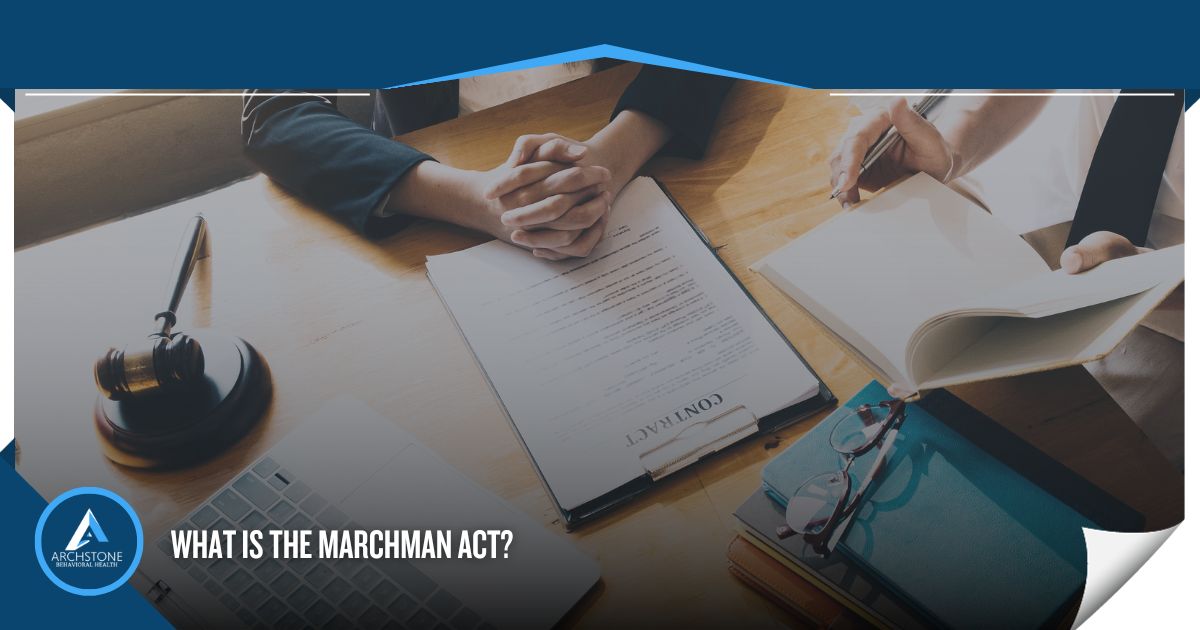What is the Marchman Act?
Get Help Now

Watching a loved one struggle with an untreated drug or alcohol addiction can be devastating. Some people may wonder if forcing loved ones to go through addiction treatment is possible. Florida has one of the most progressive involuntary addiction treatment laws in the United States, which is called the Marchman Act.
This article will explore the Marchman Act, how it works, and how to find the resources you need to use it if necessary. Reach out to the Archstone Behavioral Health specialists today to learn about the Florida Marchman Act, or to explore our comprehensive substance abuse treatment programs.
What is the Marchman Act?
In 1993, the State of Florida passed the Marchman Act– or Other Drug Services Act. The law is designed to help people get the treatment they need to overcome substance abuse and addiction, even if they are not in a state of mind to make decisions about their care. The Marchman Act encourages people to seek treatment voluntarily, but also allows concerned loved ones to file for a petition, enabling the state to commit the person to a treatment facility.
Under the Florida Marchman Act, committing someone for involuntary treatment is not taken lightly. People must go through a lengthy and thorough process to prove that their loved one meets the criteria for involuntary commitment. Once a person has been involuntarily committed to substance abuse treatments, they may be held in the facility for evaluation, detox, and treatment.
How Does the Florida Marchman Act Work?
The Marchman Act may only be used in special circumstances. This law contains precise criteria to limit how it can be used in certain situations. For example, a law enforcement officer may file for involuntary commitment under the Marchman Act if they encounter an intoxicated person with disruptive behavior. More commonly, a parent or guardian, spouse, or other relative will petition the court to involuntarily commit a loved one struggling with substance abuse.
Under the Florida Marchman Act, the petitioner must be able to prove that the person with substance abuse cannot understand the damage caused by their drug or alcohol abuse or that the person is likely to harm themselves if they do not receive supervised treatments.
One other way that the Marchman Act can be enacted is when three adults with knowledge of a person’s substance abuse petition the judge for involuntary commitment to an addiction treatment center.
Substance abuse–even heavy or prolonged abuse– is not enough to use the Marchman Act for involuntary commitment. The petitioners must provide evidence to convince a judge that a person cannot make rational decisions about their substance use and must receive addiction treatment to avoid harming themselves or others.
The Process of Filing for the Marchman Act?
It’s important to try to convince your addicted loved one to seek treatment before filing for involuntary commitment. People who accept help and seek treatment independently often have better outcomes and may feel more invested in the treatment process.
Sometimes, friends and family may choose to stage an intervention, which can be an effective way to encourage people to seek treatment. However, if you cannot convince your loved one to go to rehab, you may consider using the Florida Marchman Act to get them into treatment.
The first step of filing for the Marchman Act is contacting local treatment centers and ensuring they have immediate availability for your loved one. Then, you will need to file a petition for involuntary treatment. You can obtain the forms you need from your county clerk’s office. The forms will ask you for information about your loved one, including:
- A full description of the person
- Details on where to find the person
- The name and location of the treatment facility where your loved one should be taken
- The date and time the rehab facility is able to admit the person
- A list of current medications the person takes
- Any medical conditions that will require care during rehab
A hearing will be held within ten days of filing the petition. If the judge approves the petition, law enforcement will find the person and serve them with a Marchman Act order.
At this point, the person will have the choice to go to treatment voluntarily. However, if they refuse, law enforcement will take them to treatment against their will.
Learn More About the Florida Marchman Act
If someone in your life struggles with substance abuse or addiction and refuses to get help, you are not alone. Reach out to the Archstone Behavioral Health specialists today to learn more about using the Marchman Act. Our mental health and addiction experts will walk you through every step of the process so that you can get your loved one the help they need. Contact us today to get started.